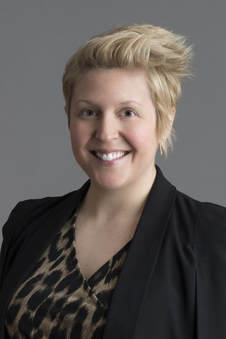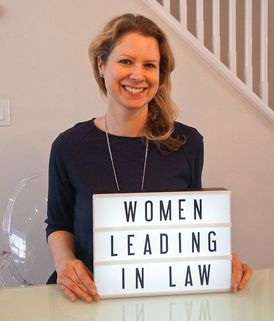 This week we have some east coast content for the Women Leading in Law series with a profile of Jennifer Taylor a research lawyer at Stewart McKelvey in Halifax. I have yet to meet Jennifer in person but have been following her on Twitter for some time and we have had some lovely Twitter conversations and exchanges. She is a "must follow" for anyone interested in feminism, women in the law, or equality issues in general (or a little pop culture for fun) . Read on to learn about Jennifer's journey in law so far, her thoughts on the importance of self-care, and how we, as lawyers, can use our privileged positions to help those around us: 1.Tell me a little about your practice or business. I am a research lawyer in Halifax, Nova Scotia, at Stewart McKelvey, a large regional firm with six offices across the Atlantic Provinces. It’s a non-partnership track role within our advocacy group and quite academic in nature (all of which was by choice). I conduct in-depth legal research on complex questions, and write a lot of memos, opinions, briefs, and factums. This work can come from any area of law but I have a special love for constitutional law. Teamwork is a huge part of our culture at Stewart McKelvey so as my practice develops I get to work on teamed files from start to finish (rather than just jumping in when a memo is needed, although I’m always happy to do that too). I also help train our students on legal research, and I remain vocal within the firm on issues related to feminism, diversity, and inclusion. 2.Why did you go to law school? Destiny, as cheesy as that sounds! My father is a lawyer at another firm in Halifax, and I think law school was in my blood even though I tried to fight it (in my high school yearbook, I said I was planning to be on Broadway). Towards the end of my undergrad in Political Science and History at Dalhousie (yeah, that acting thing didn’t work out), as I was writing my honours thesis on the Quebec Secession Reference, I realized that law had been there all along and finally started thinking about law school more seriously. My Dad had never explicitly encouraged me to go to law school until it was actually time to make the decision, at which point he was pretty firm about his recommendation. He said it would teach me how to think critically and make me a better writer, even if I didn’t end up being a lawyer. So I took his advice. My initial plan was to go to law school (which I had the privilege of doing with family support and scholarships) and then become a journalist, but the legal profession took hold of me and now I can’t imagine not being a lawyer. 3.How did you get to where you are today? Design? Chance? Both? Design (plus some lucky timing). During law school at Dalhousie, I became increasingly aware that my skills were on the academic side of law, but I did not necessarily want to pursue academia. After a lot of soul-searching, three months before graduation I gave up my original articling position (note that this was (a) out of character for me and (b) pre-recession) and gambled on getting an articling position in Toronto, with the Ministry of the Attorney General for Ontario (“MAG”). MAG has lots of academic-style articling positions and I was fortunate enough to secure one with the Crown Law Office--Criminal, which does all the criminal appeals for indictable offences in Ontario. Working on factums for the ONCA and SCC was literally a dream come true. After that, I pursued my academic inclinations in the LLM programme at the University of Cambridge (thanks to the generous J William E Mingo Memorial Scholarship for International Study); spent two blissful years as a law clerk to the Justices of the Nova Scotia Court of Appeal; and then joined Stewart McKelvey in 2013. I was very clear when I joined the firm about the kind of work I wanted to do. I realize how privileged I have been to make these choices, and to find a firm that was open to this kind of position. 4.What is your most significant achievement? What are you proud of? Winning the 2016 Zöe Odei Young Lawyers’ Award from the Nova Scotia branch of the Canadian Bar Association. This Award recognizes contributions to the CBA and the broader community, and it is named after a young lawyer from here who passed away several years ago. I didn’t have the honour of knowing Zöe, but I have heard such incredible things about her from my colleagues and it is so meaningful to carry a small piece of her legacy. 5.What are some key challenges, and more importantly, opportunities for women in law? As I wrote recently for the CBA National Blog, this is still a patriarchal profession, and you don’t have to look much further than the billable hour structure—still alive and well at most private firms—to see that. (Shout-out to Jordan Furlong’s July 2017 piece on this issue.) That said, I’m lucky to be at a firm with many women in leadership roles – including our Regional Managing Partner and our CEO. The leadership opportunities are there, but we need to retain women in private practice to keep filling the leadership pipeline. “Work-life balance” may be a cliché, but it’s also a real challenge for many women, especially in private practice. Setting boundaries and prioritizing self-care take constant effort, but that effort pays off when you’re happy with how your life looks. For me, work-life balance also involves leaving lots of time for my ‘extra-curricular activities’, like my roles as vice-chair of the Young Lawyers Section for the CBA-NS and chair of the Halifax Dance Board of Directors (and many others, from the Schulich School of Law to my church …I still find it hard to say no!). Last but not least: while it’s important to focus on advancing our own careers, we need to remember the incredible privilege we have as women lawyers, and look for opportunities to use our voices and skills to benefit those in our communities who may not have that same privilege. 6. What advice would you give a woman starting her legal career? Like I said above, set boundaries and prioritize self-care, because you can’t be good at your job if you don’t do those two things. Speaking of your job, make sure you know yourself, and what you’re truly passionate about and good at, and find a position that fits YOU rather than trying to fit yourself into some kind of “as-seen-on-Suits” lawyer mould that doesn’t align with who you are. Finally, consider it a duty to give back to the legal community and the community at large – you will find fulfillment, and your communities will benefit. ---------- Thank you Jennifer for your insights and advice (I find it hard to say "no" too! I think I suffer from a bit of FOMO ;) ICYMI: Previous posts profiled Rebecca Durcan, Atrisha Lewis, Vandana Sood, Kathryn Manning, Kim Hawkins, Kyla Lee, and Eva Chan. Sign up to have these profiles sent directly to your email address and stay tuned for the next post soon! The "Women Leading in Law" series focuses on good news stories and highlights amazing women succeeding in the legal profession. Each post includes the profiled lawyer's answers to six questions. Prepare to be inspired!
0 Comments
Your comment will be posted after it is approved.
Leave a Reply. |
Erin C. Cowling is a former freelance lawyer, entrepreneur, business and career consultant, speaker, writer and CEO and Founder of Flex Legal Network Inc., a network of freelance lawyers.
Categories
All
Archives
June 2024
|
|
(C) 2014-2024 Cowling Legal. All rights reserved.
|
Please note I am not currently practicing law.
Information on this website does not constitute legal advice and is for informational purposes only. Accessing or using this website does not create a solicitor-client relationship. See website Terms of Use/Privacy Policy. |







 RSS Feed
RSS Feed
